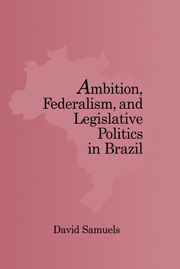Book contents
- Frontmatter
- Contents
- List of Tables and Figures
- Abbreviations and Acronyms
- Acknowledgments
- Introduction
- SECTION I
- SECTION II
- SECTION III
- 6 On the Political (In)Efficacy of Pork-Barreling in the Chamber of Deputies
- 7 Progressive Ambition, Federalism, and Pork-Barreling in Brazil
- 8 Institutions of Their Own Design? Democratization and Fiscal Decentralization in Brazil, 1975–1995
- 9 The Cardoso Administration and Changes in Brazilian Federalism
- Conclusion
- Appendix 1 Coding of Political Positions by Level of Government
- Appendix 2 List of Interviews
- References
- Author Index
- Subject Index
8 - Institutions of Their Own Design? Democratization and Fiscal Decentralization in Brazil, 1975–1995
Published online by Cambridge University Press: 28 July 2009
- Frontmatter
- Contents
- List of Tables and Figures
- Abbreviations and Acronyms
- Acknowledgments
- Introduction
- SECTION I
- SECTION II
- SECTION III
- 6 On the Political (In)Efficacy of Pork-Barreling in the Chamber of Deputies
- 7 Progressive Ambition, Federalism, and Pork-Barreling in Brazil
- 8 Institutions of Their Own Design? Democratization and Fiscal Decentralization in Brazil, 1975–1995
- 9 The Cardoso Administration and Changes in Brazilian Federalism
- Conclusion
- Appendix 1 Coding of Political Positions by Level of Government
- Appendix 2 List of Interviews
- References
- Author Index
- Subject Index
Summary
INTRODUCTION
A dramatic transformation of political institutions and processes gained momentum in Latin America in the 1980s and 1990s: decentralization of policy authority and fiscal resources to subnational governments (World Bank 1997;Willis, Haggard and Garman 1999; Montero and Samuels [eds.] n.d.). In historical perspective, decentralization marks a major shift away from a central-government dominance at all stages of the policy process – initiation, funding, and implementation. Both empirically and theoretically, decentralization raises a number of questions. What explains the move away from centralization? Is the shift more apparent than real? What are the consequences of decentralization in terms of policy performance, political accountability, and democratic governance? By shifting power and resources to regional or local levels does decentralization “boomerang” back into national politics and subsequently affect the party system and executive”legislative relations? These and other questions have gained prominence in recent studies of Latin American politics.
Continuing my focus on the policy consequences of political ambition in Brazil, in this chapter I ask “What explains the process of fiscal decentralization in Brazil since 1975?” I argue that ideology and party-system variables are largely useless to explain decentralization in Brazil, and also that although several potentially important factors such as democratization, federalism, or interest-group pressure may be necessary conditions, they are not sufficient. Strategic, ambitious politicians decided how to decentralize, and therefore any explanation of this policy choice must thus incorporate these politicians' incentives.
- Type
- Chapter
- Information
- Ambition, Federalism, and Legislative Politics in Brazil , pp. 157 - 176Publisher: Cambridge University PressPrint publication year: 2003



